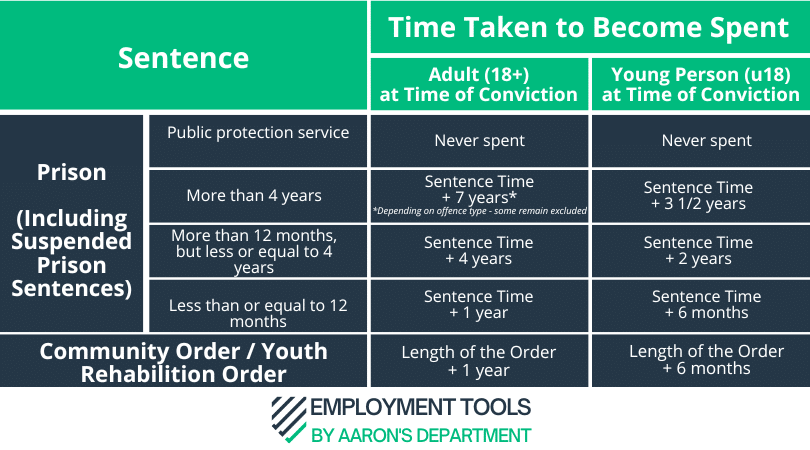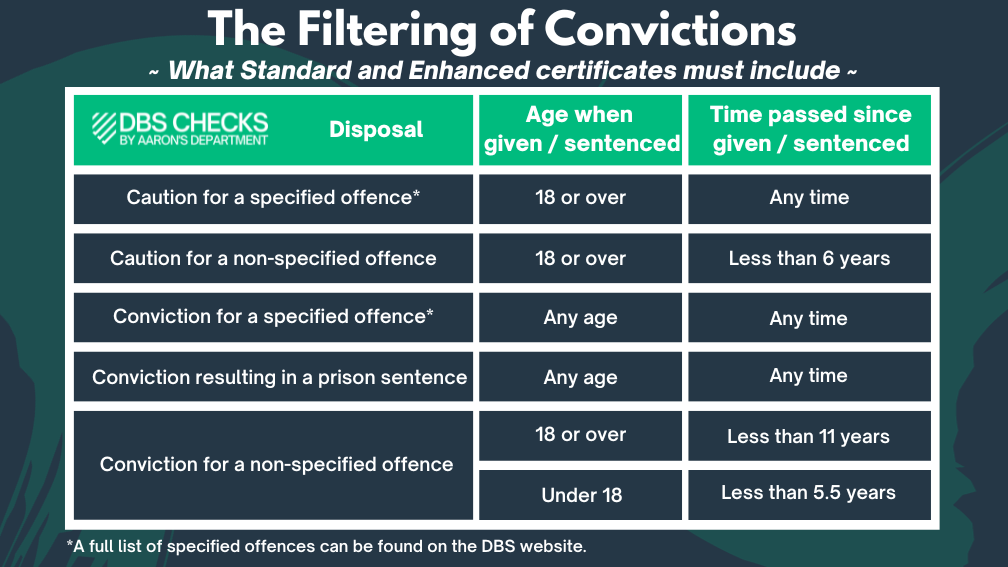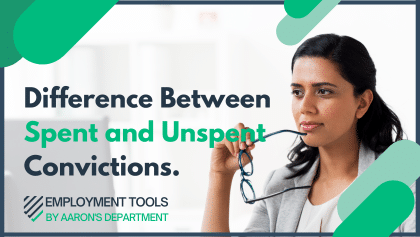The difference between spent and unspent convictions is that spent convictions are treated as if they never happened after a set time, while unspent ones are still relevant. All convictions start as unspent, and some serious offences may never become spent.
Table of Contents
What Are Unspent Convictions?
Unspent convictions are criminal records (convictions, final warnings, and/or reprimands) from the PNC that have not yet reached the time limit required to be considered “spent” under the Rehabilitation of Offenders Act 1974. Until that period passes, the conviction remains part of your criminal record and must be disclosed when applying for certain jobs, licences, or insurance.
By default, all convictions are treated as unspent. Over time, depending on the offence and sentence, some convictions may become spent, meaning they no longer need to be declared in most circumstances. Once a conviction is spent, it must be treated as if it has never happened. You can only be refused a job with an unspent conviction if it makes you unsuitable for the role.
However, some serious offences will never become spent. These include certain sexual offences, terrorism-related crimes, and other offences listed in the government’s specified offences list. These convictions will always remain unspent and must be disclosed when required by law.
You can view the government’s full list of offences that never become spent here: Unspent Convictions List
The table below can help you calculate how much time it takes for convictions to become spent:

Are Suspended Sentences Unspent Convictions?
Suspended sentences are subject to the same rules and conditions as regular sentences. This means, over time, they can become spent, and will appear on DBS checks, just like any other conviction.
What Are Spent Convictions?
Spent convictions are criminal offences that no longer need to be disclosed in most circumstances, thanks to the Rehabilitation of Offenders Act 1974 (ROA). Once a conviction becomes spent, it is treated in law as if it never happened, giving individuals the opportunity to move forward without the weight of past mistakes.
A conviction becomes spent after a specific rehabilitation period has passed without any further offences. This period varies depending on the sentence received. For example, a fine will become spent faster than a prison sentence. The aim is to support rehabilitation by allowing people to rebuild their lives once they’ve demonstrated they are no longer a risk.
Once a conviction is spent, individuals are typically not required to declare it when applying for jobs, housing, insurance, or other services — unless the role involves higher-level checks, such as Enhanced DBS checks. In those cases, even spent convictions may still be disclosed if they’re relevant.
Understanding spent convictions is especially important when completing background checks, as not all roles require disclosure of past offences. If you’re unsure what needs to be declared, it’s always worth checking the specific guidance for the type of check being carried out.
Do I Need To Tell Employers About Spent Convictions?
You only need to tell a potential employer, university or college about a spent conviction or caution if all of the following apply:
- It’s not removed (‘filtered’) from DBS certificates
- They ask you to
- They tell you that the role needs a standard or enhanced DBS check
An employer, university or college cannot legally refuse you a role because you’ve got a spent conviction or caution, unless it makes you unsuitable for the role.
What Is The Filtering of Convictions?
Filtering of convictions is the process by which certain minor offences and police cautions are removed from a person’s criminal record disclosure, meaning they no longer appear on DBS certificates. This process is designed to help individuals move on from old or less serious offences, particularly if they were committed at a young age.
Filtering applies to Standard and Enhanced DBS checks, and is separate from the rules around spent and unspent convictions, which determine what appears on a Basic DBS check. The aim of filtering is to prevent old or irrelevant convictions from negatively impacting someone’s employment or opportunities when they are no longer considered relevant.
For offences committed under the age of 18, the timeframes for filtering are generally shorter. You can view the rules and exceptions in more detail in our Guide To The Filtering Of Convictions for more detail.
Whereas the laws determining Spent and Unspent Convictions affect what is shown in a Basic check, the Filtering of Convictions rules apply to what will be shown in all levels of DBS checks.

Summary – Spent and Unspent Convictions
In short, both spent, and unspent convictions will appear on Standard and Enhanced DBS checks. However, employers must understand that spent convictions should be treated as if they never happened, unless a legal exemption applies. Most convictions do eventually become spent. In some cases, less serious offences may also be filtered, meaning they will not be shown on DBS certificates at all.
If your organisation requires DBS checks for staff or volunteers, Employment Tools by Aaron’s Department can help. As a registered Umbrella Body, we offer fast, straightforward, and affordable DBS checks for employers across the UK.
Have a question or want to get started?
Call us on 0113 877 0171 or email contact@aaronsdepartment.com. One of our DBS experts will be happy to help.
Forward this page!
Related Pages – Difference Between Spent and Unspent Convictions
If you have found this article on Spent and Unspent convictions useful, we’ve linked some related reading below:
- Do driving convictions show on DBS checks?
- Can you fail a DBS check?
- What to do if you live with someone on the Barred List
About The Author

John Schofield-Antoncich
John is an employment compliance specialist with years of hands-on experience in DBS checks and other employment check processes. Having overseen thousands of applications, he’s your trusted source for accurate, up-to-date guidance.

My mum has been wrongfully accuse of something got nfa but they will not give her dbs back so she can’t go back to work it’s been nearly a year could you help me please
Hi Dan,
What do you mean that they haven’t given her her DBS back? I would recommend talking to whoever has taken her DBS, or asking her employers to carry out a new DBS check.
As someone new in England, less than a year with His/her family/kids, and was disciplining his kids using his country method but was arrested and charged with child neglect, physical and emotional harm, and has spent less than 24 hours in the police. What is the number of years/or months he/she has to spend before working with children with DBS again?
Hi Peter,
It depends if the person has been Barred from working with Children. If they have, they will never be able to work with children again.
If not, it will likely appear as additional information on the DBS, and it will be the employer’s decision on whether to hire the individual.
Hi
Is a robbery conviction, at 17 years of age, received 18 months youth custody, in 1983, always going to show on a police certificate or DBS check?
Many thanks.
Hi Steve, this will now be what is called a Spent Conviction, for more information, why not take a look at our, Understanding Spent Convictions, article. You can read it here. https://www.employment.tools/understanding-spent-convictions.php
Hi Kellie
So I’m OK with a “basic” DBS no disclosure.
But with a “standard” or “enhanced” DBS all recorded arrests and convictions are disclosed, even if spent ?
Thanks
Hi Steve,
Yes that is correct! Unless the conviction has been filtered, it will appear in a Standard or Enhanced DBS check. Basic will only show unspent.
You can read more about filtering of convictions here: https://www.employment.tools/filtering-of-convictions.php
Hi I pushed my ex out the way in a public place 2 years ago and got fined for battery will I fail my Sia badge
Hi there,
Hi John, the information may show on your DBS check, you may find more information on this article about understanding Spent convictions. https://www.employment.tools/understanding-spent-convictions.php I am not sure on the rules of the SIA badge, it may be wise to speak to them further and explain the situation to them and see if they can advise you further.
Thank you
Thanks Kelly
hi i pleaded guilty to thieft in 2009 n was made to pay the money back will this now show on dbs check , also in 2009 i was given a 15 mth prison sentence with 15 months on license for attempted arson with intent to endanger life i no this one will show but will is it classed as a spent sentence now or not ? i wonna go to collage to train to do counselling n had to tell them bout this but concerned and not sure how this will work ?
Hi Lisa,
We’d recommend that you use the government’s spent-or-unspent checking tool to work out whether your offences will be disclosed on a DBS check – I’ve left a link to it at the bottom of this reply.
It’s worth bearing in mind that even spent offences will be disclosed on Standard & Enhanced applications, but employers must typically treat them as if they had never occurred.
I hope this helps!
https://www.gov.uk/tell-employer-or-college-about-criminal-record/check-your-conviction-caution
I got arrested for having a taser in my bag while we used it as a prank in the army I forgot I had it in my bag and got slapped with home arrest for on a tag. Ime recently looking into emegrating to australia. Any1 know if this would hinder me or how long untill its spent conviction.?